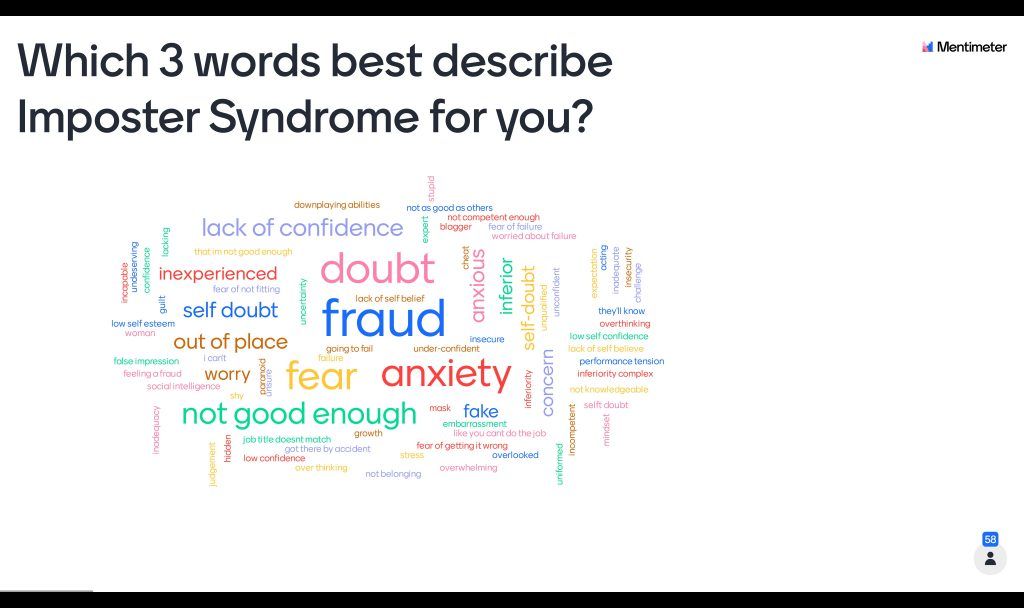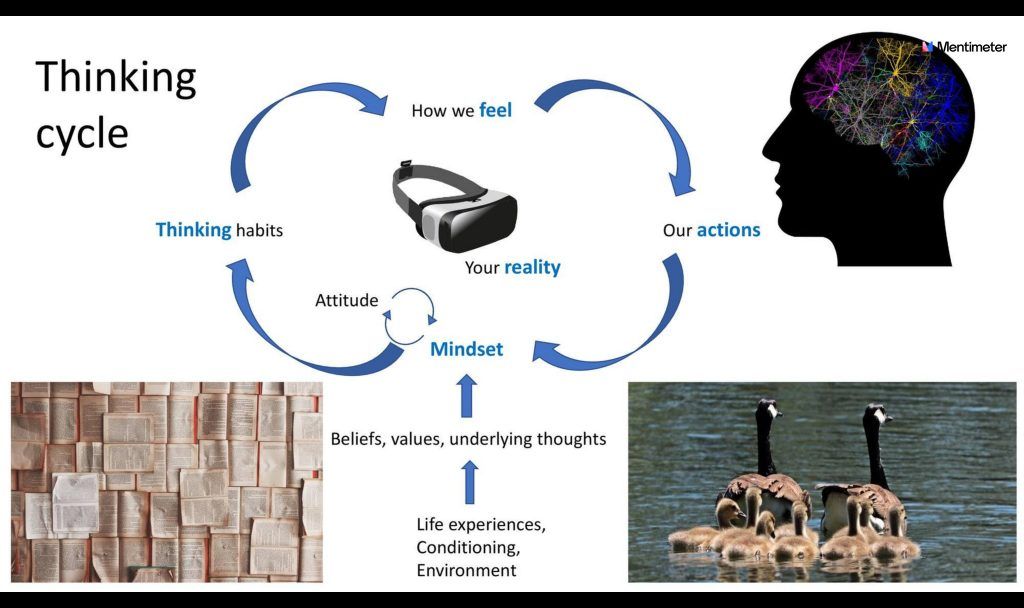As part of the CIPD Manchester Branch‘s AGM in June 2021 Kath Thomas and I delivered this interactive session. This blog summarises the discussion and inputs from the 66 people who took part.
It briefly covers:
- What is Imposter Syndrome?
- How does it arise and impact our performance (in any area)?
- A model to support your personal best
- Taking back your power
- Do the words really matter?
- So what? (the action learning)
We would recommend having a current goal in mind as you read through the blog to help you to immediately apply your learning. We would love to hear your feedback.
Has something shifted for you?
What is Imposter Syndrome?
Imposter Syndrome is described as,
The persistent inability to believe that one’s success is deserved or has been legitimately achieved as a result of one’s own efforts or skills.
Oxford Languages
Also known as Imposter Phenomenom and Impostorism, the term was introduced in 1978 by Dr Pauline Clance and Dr Suzanne Imes through their research into high achieving women. The women in their study had all achieved great things and had external validation of their accomplishments. But they lacked any internal acknowledgement. In other words, they did not ‘feel it’. The Drs defined Imposter Phenomenon as a persistent internalised fear of being exposed as a fraud.
It was assumed then that only women are affected, but we now know this is not true and we hear Imposter Syndrome mentioned increasingly by our clients and networks.
The words below are those the participants most associated with this psychological pattern where an individual doubts their skills, talents or accomplishments and fears being found out. They include fear, anxiety, doubt and feeling like a fraud.

We will return to the importance of these words later, but for now I want you to take a moment to reflect on the words we are using to describe ourselves and those around us.
Does this language support you to feel empowered, energised and resourced to find solutions or does this language limit you in some way?
How does it arise and impact your performance (in any area)?
Each one of us are wonderful, complex and unique and we are shaped by all of our life experiences, our backgrounds and the things we see, hear, read and think about. Our personal thinking cycles are all different and are continually being shaped and reshaped in a reinforcing rhythm of our thinking shaping our feelings which in turn shape our actions. The cycle repeats as shown below.

Below I tell the story I shared about my own experience to illustrate this thinking cycle and the patterns we are often blind to.
I'm not creative! I always thought that I was not creative. This was a deeply engrained belief until I was in my mid 40s. No one from my family engaged with creative activities like drawing or design and I was never really drawn to these activities in School. It was a running joke in my family that no one could draw, so this informed the mindset I brought to any creative activities I had to take part in (and I avoided them if possible). When I started my business 4 years ago I made a conscious decision to be curious about all sorts of things. I created new experiences, met new people and generally gave myself permission to experiment. Rachel Burnham taught me to sketchnote and helped me to enjoy the process too. I went on to embed sketchnoting into my work as it helped me to think differently. I sketchnoted live at conferences and began to draw and to paint exploring different medium. I have even shared some of my 'creations' on social media, an act that makes my old self want to hide away. Last week a good friend of mine, Lili, asked me to paint some iris flowers on canvas for her new goddaughter so that she can take it to Malaysia as a Christening gift. Me! The person who is not creative! There will be many, many practice runs and doubting thoughts about my abilities, but I will also enjoy creating something beautiful that I hope baby Iris will grow to love. I am not sharing this story because I think that I am a good artist. I would not describe myself in this way. BUT where was the truth in my psychological pattern? What was I missing out on by limiting myself? I now know that I can be creative and that I enjoy many creative activities too. I have a whole cupboard full or 'art kit' and one of my favourite ways to recharge is to have a playful afternoon without caring a hoot about the result. What about you?
Our performance is directly affected by our thought patterns. The science behind this is fascinating. If you are intrigued research Growth Mindsets (Carol Dweck), how habits are formed (Charles Duhigg) and the neuroscience behind our thinking patterns and neuroplasticity. What you need to know is that our brains take shortcuts via routines all the time. This is the only way we can function properly because of the amount of information we continually process. But, our brains also regenerate and change well into our old age, so
If we choose to, with the right support we have the ability to change our thinking patterns.
Take a moment. Look at the Thinking Cycle again and add ‘Imposter Syndrome’ into your mindset.
What impact does labelling yourself (or others) with Imposter Syndrome have on the rest of the thinking cycle?
When you think about your goal now are you feeling energised and looking out for opportunities or are you feeling de-energised and hopeless?
A model to support your personal best
Performance in any aspect of work or life is made up of 3 interrelated factors: skill; motivation and practice.
To perform your best you need to know where to place your energy.
Kath shared her story of training for her next open water swim (a distance of 7 miles across Ullswater on 17th July) and how lockdown has affected her usual training routine to illustrate the 3 factors.
- Skills: the skills and knowledge to complete the activity. Kath has successfully completed triathlons and long distances in open water so she knows that she has the skills she needs.
- Motivation: The right motivation to deliver. If anything, lockdown has made Kath even more determine to get back into these kinds of challenges which she enjoys.
- Practice: The opportunity to develop and learn from experience. This has been difficult with irregular swims due to changing restrictions and fewer opportunities to maintain training.
For Kath, her energy is now focussed on practice, practice, practice to give her the best chance of smashing her swim challenge.
Now, look at your goal,
score the 3 areas out of 10. Where could you place your energy right now to achieve the performance of your life?
Knowing whether you need to learn more, to seek out more information, to work on your engagement or to gain more experience of ‘doing’ helps you to focus the limited energy and resources you have.
Taking back your power
There are many techniques that can support you to overcome the feelings associated with Imposter Syndrome in addition to the performance model. We shared:
- Challenging yourself to move out of your comfort zone into your stretch zone
- Identifying your strengths (or super powers) and how they can support you with your performance challenge
- Ways of increasing your awareness of your thinking patterns and whether these are putting you on the Path of Possibility or the Path of Limitation1
Do the words matter?
We have explored what Imposter Syndrome is; the language we use to define it; how it arises from our thinking; a model for delivering our best performance and some ways to overcome Imposter Syndrome. We want to look back at the words in our word cloud and the feelings associated with Imposter Syndrome
Why have we asked you to think about the words we use and how the term Imposter Syndrome makes you think, feel and behave?
We have both witnessed the power that positive mindsets can have many times and the way that seemingly immovable obstacles can be removed when we dig beneath some of our deeply ingrained (and sometimes unhelpful) thinking patterns. We believe that labelling yourself with Imposter Syndrome is limiting because it activates our negativity bias and human tendency to focus on what we cannot do, or what we do not have, rather than what is possible.
Many of the thoughts and feelings associated with Imposter Syndrome are a natural part of everyday life. If you step into that new role you will be feeling an element of self-doubt. If you try something for the first time you will have some fear of failure. If you register for a new qualification you will notice gaps in your skills and experience.
These are completely natural and temporary feelings that we all experience at some point.
Do they deserve the label ‘Imposter Syndrome’ as often as we rush to apply the term?
So what? (the action learning bit)
If you have taken the time to read this blog there has to be a ‘so what?’ What will you do now to take a step forward towards your goal or to shift how you think and talk about Imposter Syndrome?
Can you be kinder to yourself and others? What might that bring?
We will be sharing some more thoughts over the next few months and we would love your feedback and questions.
- The Path of Possibility and Path of Limitation is one of the many Strengthscope® tools
Liz Needham and Kath Thomas are both accredited coaches and Strengthscope® Master Practitioners. This blog draws on their experience as Coaches and Consultants who have supported individuals to deliver their best performance in hundreds of situations, and their work leading teams across large and complex organisations. They are not Psychologists.
Kath Thomas is a leadership development and sports coach. As an age group triathlete and open water swimmer, performance and progress are at the heart of Kath’s own life and she uses her core beliefs around practice, support and stretch to create the right environment for people to grow and develop. She supports the development of strengths, management of risks to performance and builds understanding and appreciation of our own uniqueness and the possibilities this brings. Kath has experience across sectors and geographies. See more here or email kath@clearwater.coach
